Music and Memory音乐和记忆
音乐给我生活带来的影响英语作文初一
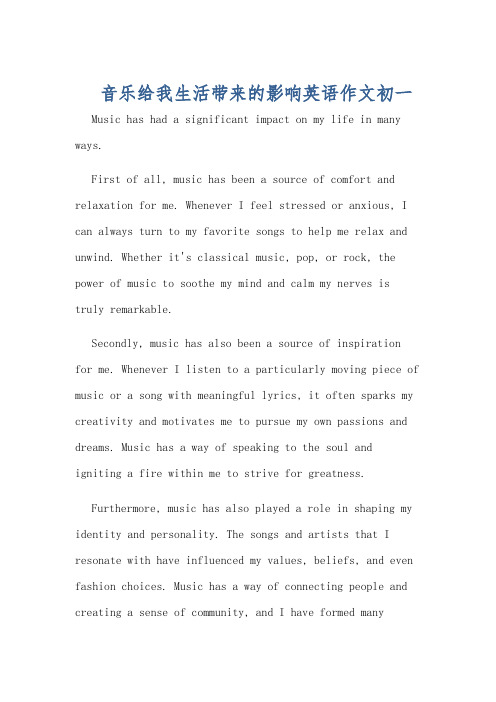
音乐给我生活带来的影响英语作文初一Music has had a significant impact on my life in many ways.First of all, music has been a source of comfort and relaxation for me. Whenever I feel stressed or anxious, I can always turn to my favorite songs to help me relax and unwind. Whether it's classical music, pop, or rock, the power of music to soothe my mind and calm my nerves istruly remarkable.Secondly, music has also been a source of inspirationfor me. Whenever I listen to a particularly moving piece of music or a song with meaningful lyrics, it often sparks my creativity and motivates me to pursue my own passions and dreams. Music has a way of speaking to the soul andigniting a fire within me to strive for greatness.Furthermore, music has also played a role in shaping my identity and personality. The songs and artists that I resonate with have influenced my values, beliefs, and even fashion choices. Music has a way of connecting people and creating a sense of community, and I have formed manyfriendships and bonds over our shared love for certain genres or bands.In addition, music has also enhanced my learning and memory. Studies have shown that listening to music can improve cognitive function and enhance memory retention. I have personally experienced this while studying for examsor trying to memorize information. Certain types of music can help me focus and retain information better, making my learning experience more enjoyable and effective.In conclusion, music has had a profound impact on mylife, providing me with comfort, inspiration, a sense of identity, and even cognitive benefits. I am grateful forthe gift of music and the positive influence it has had on me.音乐在许多方面对我的生活产生了深远的影响。
英语作文musⅰc and me

英语作文musⅰc and meMusic and MeMusic has always been an integral part of my life. From a young age, I have been captivated by the power and beauty of sound, and the way it can evoke emotions, tell stories, and connect people. Whether it's the soulful melodies of a piano concerto, the driving beat of a rock song, or the intricate harmonies of a choral piece, music has the ability to touch me in a way that nothing else can.One of my earliest memories is listening to my parents' record collection, mesmerized by the rich, warm tones of vinyl as it spun on the turntable. I would spend hours exploring the diverse array of genres, from the jazz standards of the 1940s to the psychedelic rock of the 1960s. Each album was a gateway to a different world, a new set of emotions and experiences to be discovered.As I grew older, my passion for music only deepened. I began to play instruments myself, starting with the piano and eventually branching out to the guitar and drums. The process of learning to play was both challenging and immensely rewarding, as I discovered the intricate interplay of melody, harmony, and rhythm that gives musicits power. The sense of accomplishment I felt when I was able to play a piece from start to finish was unparalleled, and it fueled my desire to continue exploring and pushing the boundaries of my musical abilities.At the same time, my appreciation for the art of music appreciation also grew. I became fascinated by the stories behind the songs and the artists who created them. I would spend hours researching the lives and creative processes of my favorite musicians, from the tortured genius of Beethoven to the experimental brilliance of Radiohead. The more I learned, the more I came to understand the profound impact that music can have on the human experience.One of the most profound aspects of music for me is its ability to transcend language and culture. Whether it's the soulful blues of the American South or the ethereal folk music of the Balkans, music has a way of connecting people across borders and barriers. It is a universal language that can be understood and appreciated by people from all walks of life, regardless of their background or personal experiences.This universality of music has been particularly meaningful to me as I have traveled the world and encountered new cultures and traditions. In every country I have visited, I have been struck by the way that music is woven into the fabric of daily life, whether it's the rhythmicdrumming of a West African village or the haunting melodies of a Tibetan monastery. Each time, I have been humbled by the realization that music is not just a form of entertainment, but a fundamental expression of the human experience.At the same time, music has also been a deeply personal and transformative force in my own life. There have been countless moments when a piece of music has spoken to me on a profound emotional level, helping me to process and make sense of the complexities of my own experiences. Whether it's the cathartic release of a heavy metal anthem or the contemplative beauty of a classical piano piece, music has the power to touch me in ways that words simply cannot.Indeed, music has become an integral part of my identity, shaping the way I perceive the world and interact with those around me. It has been a source of comfort and inspiration, a way to express myself and connect with others. And as I look to the future, I know that music will continue to be a driving force in my life, guiding me through the highs and lows, and helping me to navigate the ever-changing landscape of my personal and professional experiences.In the end, my love for music is not just a hobby or a passing interest, but a fundamental part of who I am. It is a language that I have come to understand and cherish, a way of experiencing the world that hasenriched my life in countless ways. And as I continue to explore and discover new forms of musical expression, I know that the journey will be one of endless possibility and profound personal growth.。
音乐对大脑的影响

音乐语言
语言和音乐作为两个以相同方式发展的平行系统,具有许多相同的特性。在出生后的第一年里,婴儿的牙牙学语和自发哼唱前兆是很难区分的。他们通过聆听、模仿看护人的非言语父母亲的话
依然有很多父母认为听音乐会让孩子更聪明。人们相信存在莫扎特效应,并认为最初的研究也是针对婴儿的,这正因为婴儿是人们焦虑的中心——望子成龙、盼女成凤的典型表现。听还是不听,成为摆在面前的选择题。莫扎特或一切古典音乐,都未被证明有提高智商的魔力,但这不会妨碍人们喜欢去聆听,至少不会毒害你的身体,降低你的智商。
●提高婴幼儿大小肌肉的运动能力。
●提高婴幼儿的听力---接触过大量音乐的孩子能更好地在较长时间内集中注意力,而不影响别人。
事实证据
音乐与数学的关系
许多研究报告指出,音乐训练能带来正面效应,能培养婴幼儿的视觉空间感。虽然视觉空间感只是一种抽象的解决问题的技能,却对数学的理解至关重要。加州大学尔湾分校的艾米·格兰齐埃诺、马休·彼得森和戈登·肖最近发现音乐训练和数学能力之间有着直接的联系。他们让一群二年级学生分成三组分别上钢琴课、英语课或不上课,然后,从每组学生中抽取一定比例的测试对象给他们进行附加的视觉空间训练,内容是玩一种特别设计的电视游戏。然后,就测试对象在解决数学问题能力方面进行研究。结果表明,在这些测试对象中,选择钢琴课学生的得分比选择英语课和不上课的学生的得分分别高出26.7%和154.5%。
音乐对大脑的影响
以下许多证据表明,幼儿早期接触音乐能长期受益。
●能在视觉空间推理能力测试中取得高分---一种在许多任务中都需要的技能(包括数学)。
音乐与记忆的联系
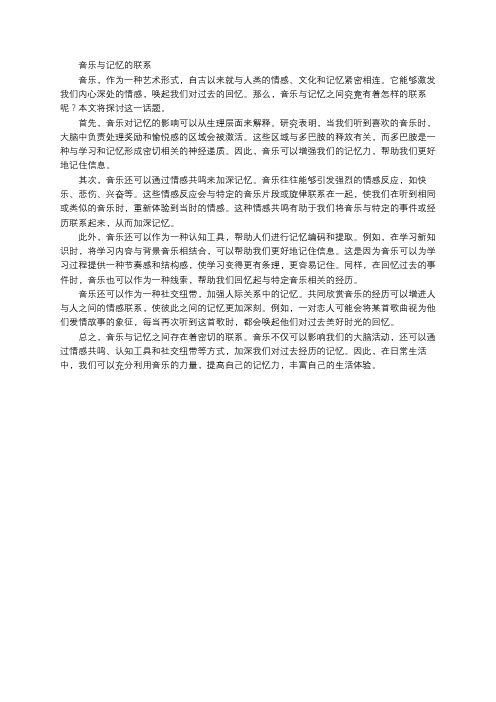
音乐与记忆的联系音乐,作为一种艺术形式,自古以来就与人类的情感、文化和记忆紧密相连。
它能够激发我们内心深处的情感,唤起我们对过去的回忆。
那么,音乐与记忆之间究竟有着怎样的联系呢?本文将探讨这一话题。
首先,音乐对记忆的影响可以从生理层面来解释。
研究表明,当我们听到喜欢的音乐时,大脑中负责处理奖励和愉悦感的区域会被激活。
这些区域与多巴胺的释放有关,而多巴胺是一种与学习和记忆形成密切相关的神经递质。
因此,音乐可以增强我们的记忆力,帮助我们更好地记住信息。
其次,音乐还可以通过情感共鸣来加深记忆。
音乐往往能够引发强烈的情感反应,如快乐、悲伤、兴奋等。
这些情感反应会与特定的音乐片段或旋律联系在一起,使我们在听到相同或类似的音乐时,重新体验到当时的情感。
这种情感共鸣有助于我们将音乐与特定的事件或经历联系起来,从而加深记忆。
此外,音乐还可以作为一种认知工具,帮助人们进行记忆编码和提取。
例如,在学习新知识时,将学习内容与背景音乐相结合,可以帮助我们更好地记住信息。
这是因为音乐可以为学习过程提供一种节奏感和结构感,使学习变得更有条理,更容易记住。
同样,在回忆过去的事件时,音乐也可以作为一种线索,帮助我们回忆起与特定音乐相关的经历。
音乐还可以作为一种社交纽带,加强人际关系中的记忆。
共同欣赏音乐的经历可以增进人与人之间的情感联系,使彼此之间的记忆更加深刻。
例如,一对恋人可能会将某首歌曲视为他们爱情故事的象征,每当再次听到这首歌时,都会唤起他们对过去美好时光的回忆。
总之,音乐与记忆之间存在着密切的联系。
音乐不仅可以影响我们的大脑活动,还可以通过情感共鸣、认知工具和社交纽带等方式,加深我们对过去经历的记忆。
因此,在日常生活中,我们可以充分利用音乐的力量,提高自己的记忆力,丰富自己的生活体验。
音乐的好处英语作文带翻译
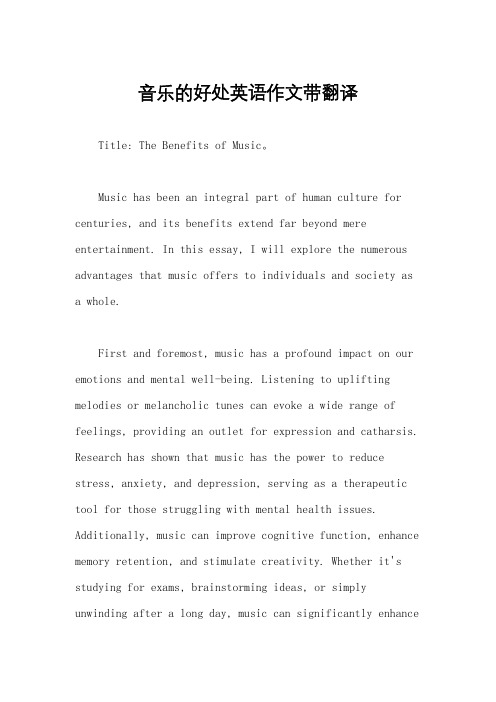
音乐的好处英语作文带翻译Title: The Benefits of Music。
Music has been an integral part of human culture for centuries, and its benefits extend far beyond mere entertainment. In this essay, I will explore the numerous advantages that music offers to individuals and society as a whole.First and foremost, music has a profound impact on our emotions and mental well-being. Listening to uplifting melodies or melancholic tunes can evoke a wide range of feelings, providing an outlet for expression and catharsis. Research has shown that music has the power to reduce stress, anxiety, and depression, serving as a therapeutic tool for those struggling with mental health issues. Additionally, music can improve cognitive function, enhance memory retention, and stimulate creativity. Whether it's studying for exams, brainstorming ideas, or simply unwinding after a long day, music can significantly enhanceour mental processes and overall quality of life.Furthermore, music has the remarkable ability to bring people together and foster a sense of community. From ancient tribal rituals to modern-day concerts, music has always played a central role in social gatherings and cultural celebrations. Whether it's singing along to a favorite song with friends or attending a live performance with thousands of strangers, music has a unique way of transcending barriers and uniting people from diverse backgrounds. In today's interconnected world, platformslike Spotify and YouTube enable individuals to discover and share music across borders, creating a global community of music lovers.Moreover, music education has been shown to have numerous benefits for children and adolescents. Learning to play a musical instrument not only teaches discipline and perseverance but also enhances academic performance. Studies have found a positive correlation between music education and improved math and language skills, as well as higher IQ scores. Furthermore, participating in schoolbands or choirs promotes teamwork, communication, and leadership skills, preparing students for success in both academic and professional settings. By investing in music education, schools can nurture the next generation of creative thinkers and problem solvers.In addition to its individual and social benefits, music also plays a vital role in promoting cultural understanding and preserving heritage. Every culture hasits own unique musical traditions, which reflect its history, values, and identity. By exploring different musical genres and styles, we gain insights into the richness and diversity of human experience. Whether it's classical symphonies, traditional folk songs, or contemporary hip-hop, music serves as a bridge between past and present, connecting us to our roots while alsoinspiring innovation and evolution.In conclusion, music is not merely a form of entertainment but a powerful force for personal growth, social cohesion, and cultural enrichment. By embracing music in all its forms, we can harness its transformativepotential to create a more harmonious and inclusive world.(翻译)。
听音乐对我的帮助 英语作文
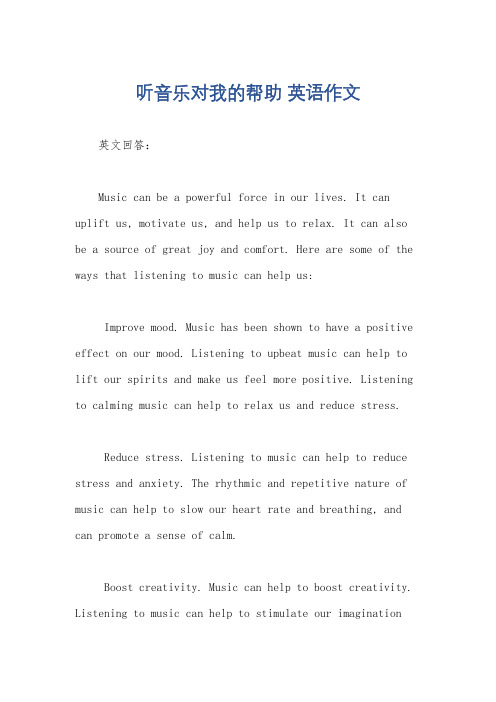
听音乐对我的帮助英语作文英文回答:Music can be a powerful force in our lives. It can uplift us, motivate us, and help us to relax. It can also be a source of great joy and comfort. Here are some of the ways that listening to music can help us:Improve mood. Music has been shown to have a positive effect on our mood. Listening to upbeat music can help to lift our spirits and make us feel more positive. Listening to calming music can help to relax us and reduce stress.Reduce stress. Listening to music can help to reduce stress and anxiety. The rhythmic and repetitive nature of music can help to slow our heart rate and breathing, and can promote a sense of calm.Boost creativity. Music can help to boost creativity. Listening to music can help to stimulate our imaginationand get our creative juices flowing.Improve focus and concentration. Listening to music can help to improve focus and concentration. The rhythmic and repetitive nature of music can help to keep our minds focused on the task at hand.Promote relaxation. Music can help to promote relaxation. Listening to calming music can help to slow our heart rate and breathing, and can promote a sense of peace and tranquility.Enhance sleep. Listening to calming music can help to enhance sleep. The rhythmic and repetitive nature of music can help to lull us to sleep and improve the quality of our sleep.Reduce pain. Music can help to reduce pain. Listening to music can help to distract us from pain and make it more tolerable.Improve memory. Music can help to improve memory.Listening to music can help to strengthen the connections between neurons in our brain, which can improve our ability to remember things.Foster social bonds. Music can help to foster social bonds. Listening to music together can help to create a sense of community and belonging.Provide comfort. Music can provide comfort during difficult times. Listening to music can help us to feelless alone and can give us a sense of hope and strength.中文回答:音乐对我们的生活而言是一股强大的力量。
听音乐的好处英语作文
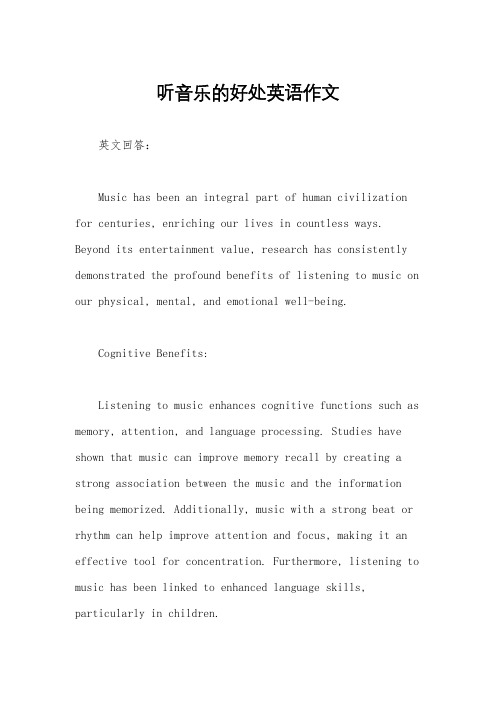
听音乐的好处英语作文英文回答:Music has been an integral part of human civilization for centuries, enriching our lives in countless ways. Beyond its entertainment value, research has consistently demonstrated the profound benefits of listening to music on our physical, mental, and emotional well-being.Cognitive Benefits:Listening to music enhances cognitive functions such as memory, attention, and language processing. Studies have shown that music can improve memory recall by creating a strong association between the music and the information being memorized. Additionally, music with a strong beat or rhythm can help improve attention and focus, making it an effective tool for concentration. Furthermore, listening to music has been linked to enhanced language skills, particularly in children.Emotional Benefits:Music has a powerful impact on our emotions. It can evoke a wide range of feelings, from happiness and excitement to sadness and tranquillity. Listening to music that resonates with our current emotional state can provide a sense of comfort,释放 stress, and regulate our moods. Moreover, music has been shown to reduce anxiety and promote relaxation, making it a valuable therapeutic tool.Physical Benefits:Music has been found to have various physical benefits as well. It can reduce pain, improve sleep, and boost the immune system. Listening to music during exercise has been shown to increase endurance and reduce perceived exertion. Additionally, music can promote relaxation, reducing muscle tension and blood pressure.Social Benefits:Music brings people together and fosters a sense of community. Sharing musical experiences with others can create bonds, promote collaboration, and reduce social isolation. Music is often used in group activities, such as dancing, singing, and playing instruments, providing opportunities for social interaction and connection.Therapeutic Benefits:Music therapy is a recognized form of healthcare that uses music to address physical, emotional, and cognitive challenges. Music therapists use music to improve communication, reduce stress, and promote healing. It has been shown to be effective in treating conditions such as dementia, Parkinson's disease, and autism.In conclusion:Listening to music offers a wealth of benefits for our physical, mental, emotional, and social well-being. From enhancing cognitive abilities to reducing stress and promoting relaxation, music has the power to positivelyimpact our lives in numerous ways. By incorporating music into our daily routines, we can reap its many benefits and live healthier, happier, and more fulfilling lives.中文回答:音乐对身体和心理的益处。
音乐对我们生活的影响英语作文
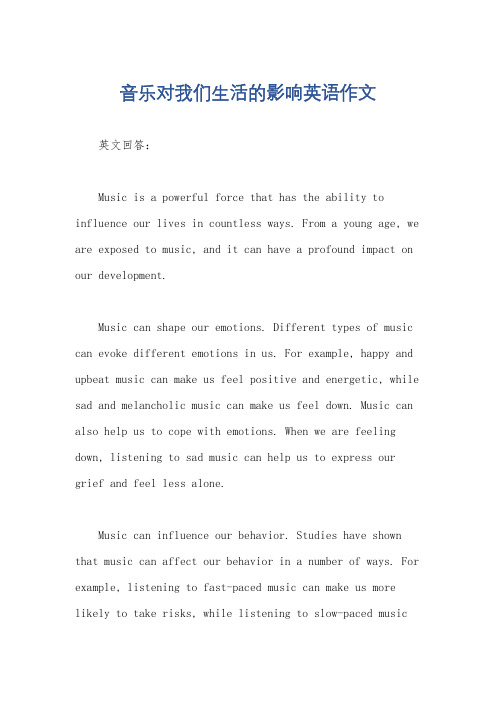
音乐对我们生活的影响英语作文英文回答:Music is a powerful force that has the ability to influence our lives in countless ways. From a young age, we are exposed to music, and it can have a profound impact on our development.Music can shape our emotions. Different types of music can evoke different emotions in us. For example, happy and upbeat music can make us feel positive and energetic, while sad and melancholic music can make us feel down. Music can also help us to cope with emotions. When we are feeling down, listening to sad music can help us to express our grief and feel less alone.Music can influence our behavior. Studies have shown that music can affect our behavior in a number of ways. For example, listening to fast-paced music can make us more likely to take risks, while listening to slow-paced musiccan make us more likely to be cautious. Music can also be used to motivate us. For example, listening to upbeat music while exercising can help us to push ourselves harder.Music can promote social bonding. Music is a powerful force that can bring people together. When we sing or dance together, we are creating a shared experience that can help to build bonds between us. Music can also be used to break down barriers between people. For example, music has been used to promote peace and understanding between different cultures.Music can enhance our learning. Studies have shown that music can enhance our learning and memory. For example, listening to music while studying can help us to remember information more effectively. Music can also be used to teach us new skills. For example, learning to play a musical instrument can help us to develop our coordination and fine motor skills.Music can help us to relax and de-stress. After a long day, there is nothing quite like listening to some relaxingmusic to help us unwind and de-stress. Music can help to slow our heart rate, lower our blood pressure, and reduce our stress levels. Music can also be used to improve our sleep. For example, listening to calming music before bed can help us to fall asleep more easily and sleep more soundly.Music is a powerful force that can have a profound impact on our lives. It can shape our emotions, influence our behavior, promote social bonding, enhance our learning, help us to relax and de-stress, and much more.中文回答:音乐是一种强大的力量,能以无数种方式影响我们的生活。
- 1、下载文档前请自行甄别文档内容的完整性,平台不提供额外的编辑、内容补充、找答案等附加服务。
- 2、"仅部分预览"的文档,不可在线预览部分如存在完整性等问题,可反馈申请退款(可完整预览的文档不适用该条件!)。
- 3、如文档侵犯您的权益,请联系客服反馈,我们会尽快为您处理(人工客服工作时间:9:00-18:30)。
Music and Memory音乐和记忆
作者:
来源:《时代英语·高一》2013年第05期
Even if you haven’t touched a piano in years, you suffered through music lessons as a kid and you may have benefited from those lessons in ways you wouldn’t expect. When you train on a musical instrument, your brain is stimulated and changes and develops as a result. Because the parts of the brain are interconnected,this stimulation doesn’t affect musical ability only.
Psychologists have discovered that the stimulation musical training enacts on the left temporal region of your brain and enhances memory. People with musical training are significantly better at recalling words from a list and learning new words. What’s more, the longer the duration of musical training, the better the memory.
So while children who study music for two years demonstrate better memory than children who have not studied music, children who continue to study music continue to improve their memory.
The good news for those of us who trained on musical instruments but quit at some point is that we don’t seem to lose the benefits we gain from this training.
Scientists are particularly interested in what this suggests about the interconnectedness of the brain and thus the predictability of the effects of stimulation to a brain area on cognitive functions located in that area. Further research may lead to developments in cognitive rehabilitation for people with brain injuries. For example, in order to rebuild memory in patients with injury to that part of the brain, doctors may prescribe music lessons.
即使你已经很久没有弹钢琴,但只要你小时候学过钢琴,你就能在各个意想不到的方面受益于这些钢琴课。
当你在训练一种乐器时,大脑受到刺激而变化生长。
由于大脑的各个部分是相互连接的,这种刺激不会只影响到音乐能力。
心理学家还发现,这种音乐刺激训练担当大脑的左颞区来提高记忆。
接受过音乐训练的人能够更容易记住单词,学习新的单词也更容易。
更重要的是,音乐训练的时间越久,记忆能力也越强。
因此,学过两年音乐的孩子,他们的记忆比没学过音乐的孩子要强得多,而继续学习音乐孩子的记忆也会随之提高。
有个好消息就是对于那些学过乐器后来又放弃的同学,你们并不会失去受过这种训练的好处。
科学家们对大脑的这种相互关联性特别感兴趣,从而预测音乐刺激对大脑认知能力的影响就在这个区域。
进一步的研究可能导向对脑损伤病人在认知康复的发展。
例如,为了重建病人大脑受损的记忆部分,医生也许会开设音乐课。
